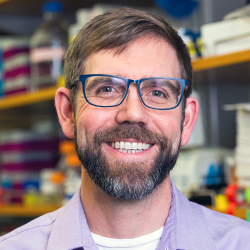Repurposing the Ribosome for Synthetic Biology
New work funded by highly competitive MURI grant
Over the past several years, Northwestern Engineering’s Michael Jewett did the seemingly impossible. He overcame the critical barrier to making mutant ribosomes, the core catalyst in cells that are responsible for life.
Now, with funding from the Department of Defense’s Multidisciplinary University Research Initiatives (MURI) program, Jewett is ready to take this research to the next level. Along with a multi-school team, he plans to use engineer and repurpose the ribosome to make new kinds of polymers for flow batteries.

The MURI grant joins researchers from Northwestern, University of Illinois at Urbana-Champaign, University of Texas at Austin, and Georgia Institute of Technology who will work together to develop new types of electrical materials for battery storage. By using biological catalysts, the team aims to produce materials for sustainable, rechargeable batteries that are currently impossible to make chemically.
The MURI program aims to accelerate research progress by supporting teams of investigators that intersect more than one traditional science and engineering discipline. Jewett’s team is one of 23 advanced science and engineering research projects funded by the MURI program this year. The highly competitive award grants $1.25 million a year for five years.

“The ability to make synthetic polymers with perfect sequence control is a holy grail in polymer science,” said Charles Schroeder, associate professor and Ray and Beverly Mentzer Scholar in Chemical and Biological Engineering at the University of Illinois at Urbana-Champaign. “Our approach holds strong promise to enable the synthesis of precision polymeric materials with levels of control that have not yet been achievable.”
A synthetic biologist and co-director of Northwestern’s Center for Synthetic Biology, Jewett will collaborate with University of Texas’s Andrew Ellington and Georgia Tech’s Eric Gaucher to reengineer the ribosome as a biological catalyst to make novel chemical polymers. While the ribosome already makes biopolymers, such as proteins like insulin or subtilisin in laundry detergents, the MURI team aims to teach the ribosome to make different types of polymers, enabled by chemistry that has yet to exist in the living world. Polymer scientists at the University of Illinois, including Schroeder and Jeff Moore, will then test and characterize the work, which could have applications well beyond batteries, such as in nanoscale self-assembly, electromagnetic interference shielding, and anticorrosion coatings for steel.
“We are merging the best of biology and chemistry to set up an innovative future,” Jewett said. “These fields can work together to solve many of society’s needs and our efforts hold promise to enable synthetic biology to become a major driver of global innovation and sustainable economic growth.”